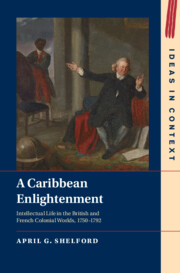Book contents
- A Caribbean Enlightenment
- Ideas in Context
- A Caribbean Enlightenment
- Copyright page
- Dedication
- Contents
- Figures
- Maps
- Tables
- Acknowledgments
- Note on the Text
- Abbreviations
- Chapter 1 What Is a Caribbean Enlightenment?
- Part I Before Breadfruit
- Part II Creating Enlightened Citizens
- Part III Tristram in the Tropics: or, Reading in Jamaica
- Introduction to Part III
- Chapter 7 Whence, Whither, and Which Books?
- Chapter 8 “Truth Hard to be Discovered”
- Chapter 9 Containing the Overflowing Fountain of His Brain
- Conclusion to Part III
- Part IV Cultivating Knowledge
- Bibliography
- Index
Chapter 7 - Whence, Whither, and Which Books?
from Part III - Tristram in the Tropics: or, Reading in Jamaica
Published online by Cambridge University Press: 14 September 2023
- A Caribbean Enlightenment
- Ideas in Context
- A Caribbean Enlightenment
- Copyright page
- Dedication
- Contents
- Figures
- Maps
- Tables
- Acknowledgments
- Note on the Text
- Abbreviations
- Chapter 1 What Is a Caribbean Enlightenment?
- Part I Before Breadfruit
- Part II Creating Enlightened Citizens
- Part III Tristram in the Tropics: or, Reading in Jamaica
- Introduction to Part III
- Chapter 7 Whence, Whither, and Which Books?
- Chapter 8 “Truth Hard to be Discovered”
- Chapter 9 Containing the Overflowing Fountain of His Brain
- Conclusion to Part III
- Part IV Cultivating Knowledge
- Bibliography
- Index
Summary
Publications were the most important links to Enlightenment intellectual culture across the Atlantic World. Jamaicans acquired publications in quantity despite the difficulty and expense, challenging the colonial reputation of philistinism. The trade in books and periodicals was connected to a commercial revolution that brought a variety of cultural commodities—musical instruments, telescopes, globes, etc.—to colonial and metropolitan doorsteps. These objects helped assert their owners’ gentility: a wealthy planter might house his collection in a suitably dignified library, but a Kingston businessman could showcase his modest collection in a mahogany bookcase, and a merchant based in a small coastal town could increase his intellectual capital by borrowing reading material from neighbors and friends. Evidence drawn from a variety of sources—advertisements for books and book furnishings; book orders and library inventories; accounts of borrowing and lending—show that Jamaican readers could satisfy a desire for everything from the classics of Antiquity to now-canonical Enlightenment works, from sentimental and scurrilous novels to popularizing works of science and practical how-to treatises.
Keywords
- Type
- Chapter
- Information
- A Caribbean EnlightenmentIntellectual Life in the British and French Colonial Worlds, 1750–1792, pp. 174 - 196Publisher: Cambridge University PressPrint publication year: 2023

